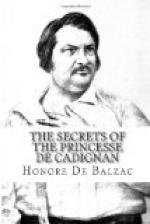invent anything as direful as that. Ordinarily,
according to the little that I know of literature,
a drama is a suite of actions, speeches, movements
which hurry to a catastrophe; but what I speak of
was a catastrophe in action. It was an avalanche
fallen in the morning and falling again at night only
to fall again the next day. I am cold now as
I speak to you of that cavern without an opening,
cold, sombre, in which I lived. I, poor little
thing that I was! brought up in a convent like a mystic
rose, knowing nothing of marriage, developing late,
I was happy at first; I enjoyed the goodwill and harmony
of our family. The birth of my poor boy, who is
all me—you must have been struck by the
likeness? my hair, my eyes, the shape of my face,
my mouth, my smile, my teeth!—well, his
birth was a relief to me; my thoughts were diverted
by the first joys of maternity from my husband, who
gave me no pleasure and did nothing for me that was
kind or amiable; those joys were all the keener because
I knew no others. It had been so often rung into
my ears that a mother should respect herself.
Besides, a young girl loves to play the mother.
I was so proud of my flower—for Georges
was beautiful, a miracle, I thought! I saw and
thought of nothing but my son, I lived with my son.
I never let his nurse dress or undress him. Such
cares, so wearing to mothers who have a regiment of
children, were all my pleasure. But after three
or four years, as I was not an actual fool, light
came to my eyes in spite of the pains taken to blindfold
me. Can you see me at that final awakening, in
1819? The drama of ’The Brothers at enmity’
is a rose-water tragedy beside that of a mother and
daughter placed as we then were. But I braved
them all, my mother, my husband, the world, by public
coquetries which society talked of, —and
heaven knows how it talked! You can see, my friend,
how the men with whom I was accused of folly were
to me the dagger with which to stab my enemies.
Thinking only of my vengeance, I did not see or feel
the wounds I was inflicting on myself. Innocent
as a child, I was thought a wicked woman, the worst
of women, and I knew nothing of it! The world
is very foolish, very blind, very ignorant; it can
penetrate no secrets but those which amuse it and
serve its malice: noble things, great things,
it puts its hand before its eyes to avoid seeing.
But, as I look back, it seems to me that I had an attitude
and aspect of indignant innocence, with movements
of pride, which a great painter would have recognized.
I must have enlivened many a ball with my tempests
of anger and disdain. Lost poesy! such sublime
poems are only made in the glowing indignation which
seizes us at twenty. Later, we are wrathful no
longer, we are too weary, vice no longer amazes us,
we are cowards, we fear. But then—oh!
I kept a great pace! For all that I played the
silliest personage in the world; I was charged with
crimes by which I never benefited. But I had such




